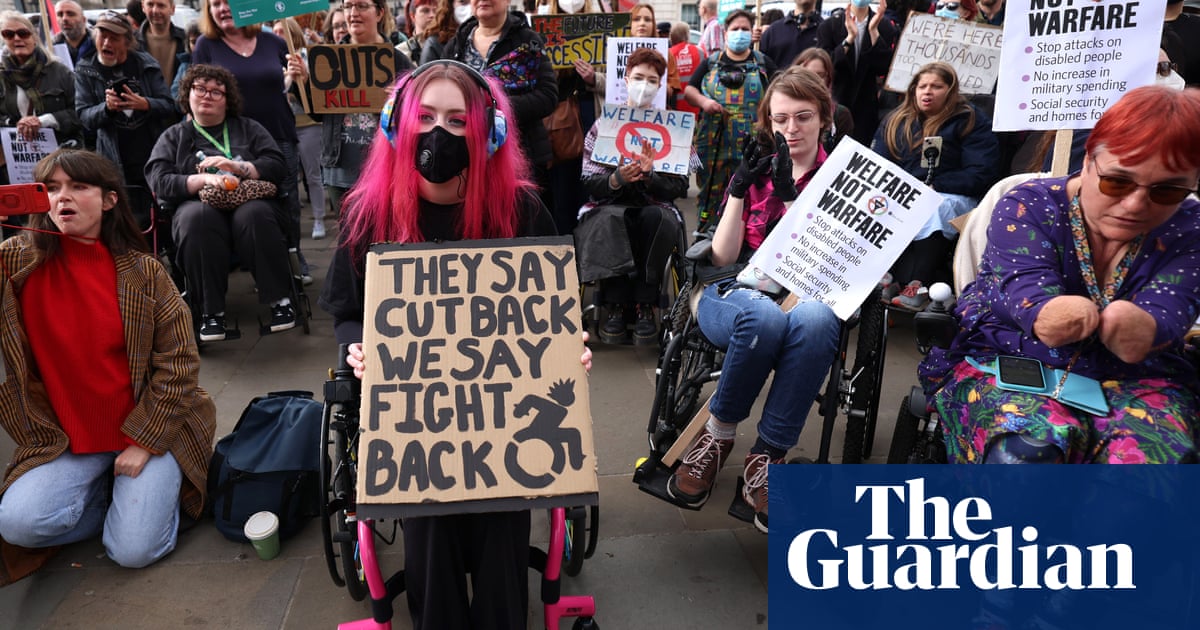Downing Street’s disability cuts will have a “devastating” impact on women’s health and dignity and could breach equality law, the government has been warned.
Charities and disabled people’s organisations including Scope, Spinal Injuries Association, Inclusion London, ME Association and WinVisible told the Guardian that tightening eligibility for personal independence payments (Pip) would mean disabled women being discriminated against, due to their higher personal care needs compared with men.
Under the new rules, to be voted on by MPs next week, a claimant must receive four points in a single daily living category to qualify for the payment.
Washing below the waist will score just two – half the number given to needing assistance between the shoulders and waist. It means the new four-point rule won’t take into account menstruation or some women’s extra toilet requirements, such as incontinence from pregnancy, unless they have additional needs.
“The proposed changes to the Pip assessment criteria ignore fundamental aspects of women’s health and dignity,” said Dharshana Sridhar, campaigns manager at the Spinal Injuries Association.
The decision to award fewer points for assistance with personal care below the waist overlooked the realities of menstruation, incontinence and intimate hygiene; needs that were especially complex and often more acute for women with spinal cord injuries, Sridhar said.
“By failing to recognise the distinct and disproportionate impact of these changes on disabled women, the proposals risk breaching the Equality Act 2010, both in terms of sex and disability discrimination, and the Public Sector Equality Duty. A benefits system that systematically disregards menstruation, personal care, and continence management for disabled women cannot credibly claim to meet its legal obligations to promote equality and eliminate discrimination.”
Hat Porter, a spokesperson for the menstrual justice charity Irise, said: “Already Pip applicants with conditions like endometriosis and fibroids face a much lower than average application success rate, with claimants’ debilitating symptoms being dismissed as “just a period”.
“Tightening the eligibility criteria would make it even harder to access financial support. For those who use Pip to cover the costs of carers or social care fees, having this lifeline stripped away could leave them without the support they need to manage tasks like changing period products. That would have a devastating impact on their dignity as well as health.”
More than 100 Labour MPshave signed a Commons amendment to halt the cuts in their tracks, enough to threaten Keir Starmer’s majority. One hundred and eight MPs’ signatures appear on an amendment declining to give the welfare reform bill a second reading when it returns to the Commons on 1 July. The rebellion, the prime minister’s largest yet, would be enough to defeat the government’s plans if opposition MPs joined the Labour rebels.
There are wider concerns that women will be more likely to miss out on Pip under the new rules, after the government’s ownimpact assessmentshowed more women than men currently score fewer than four points on descriptors while getting a daily living award.
The ME Association said that Pip’s existing “majority of the time” rule – which says a claimant must be unable to do an activity more than half the time to qualify – would compound the discrimination against women.
“Menstrual symptoms, by definition, occur intermittently and may not affect a woman for over 50% of the time – meaning they are often excluded from consideration, regardless of how severely disabling they are when present,” said Ella Smith, the charity’s welfare rights consultant.
“In practice, this could lead to many women losing eligibility under the proposed four-point rule, not because their support needs are minor, but because those needs are dispersed across multiple activities or occur cyclically. With Pip being positioned to replace the work capability assessment as the sole gateway to assessing work capability, it is imperative that the new system takes account of intermittent yet profoundly disabling experiences such as menstruation.”
Jessica Leigh, campaigns manager at Scope, said the charity had heard from hundreds of disabled people who relied on benefits to afford sanitary products, incontinence pads, and needing to do more laundry. “Disabled people are extremely concerned their personal hygiene and health will be among the many devastating costs of these cuts,” she said.
The Pip changes come amid strained NHS community and social care, which several disabled people’s organisations told the Guardian had already led to basic hygiene being treated as a luxury for some disabled women.
Tumu Johnson, a spokesperson for Sisters of Frida, a disabled women’s group, says: “Disabled women have been told [by local councils] to wear incontinence pads instead of being provided support to use the toilet. They have also been told to use the hormonal pill to stop their periods instead of support to manage their menstruation the way they choose. We’ve heard from many disabled women who are scared that the Pip changes mean they could now lose vital personal care, on top of their other needs.”
A Department for Work and Pensions spokesperson said: “The vast majority of people who are currently getting Pip will continue to receive it. We’re creating a sustainable welfare system that genuinely supports sick and disabled people while always protecting those who need it most.
“At the heart of this is our review of the Pip assessment to ensure it is fit for the future. We will work with disabled people and a range of experts on this as we deliver our plan for change.”
